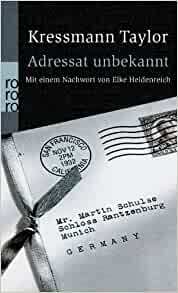Take a photo of a barcode or cover
One American woman was paying attention to the news leaking out of Germany in the 1930s and she published this story in 1938 to raise the public's awareness of how truly dangerous fascism is. It went viral immediately, with reprints in several national magazines, a bestselling book edition, and readers even making copies to give to friends. And I can see why: the story is brisk and shocking, and yet the drama of a lifetime unfolds in just a few short letters.
The inspiration for the story is chilling. Frat bros decided to play a prank on some of their friends in Germany and sent them letters making fun of Nazis. Their friends' response was sobering -- stop, you are putting our lives in danger, a Nazi can get killed over a letter. And so the author wrote a story in which a letter becomes as lethal as a weapon.
The inspiration for the story is chilling. Frat bros decided to play a prank on some of their friends in Germany and sent them letters making fun of Nazis. Their friends' response was sobering -- stop, you are putting our lives in danger, a Nazi can get killed over a letter. And so the author wrote a story in which a letter becomes as lethal as a weapon.
dark
emotional
reflective
sad
medium-paced
Plot or Character Driven:
Character
Strong character development:
Yes
Loveable characters:
N/A
Diverse cast of characters:
N/A
Flaws of characters a main focus:
Yes
Short but impactful. What a heartbreaking story that's feeling way too familiar these days.
Address Unknown by Katherine Kressmann Taylor is credited as being an early warning cry in the US about the rising tide of facism and the atrocities committed under Hitler. Published in Story Magazine in 1938 under the name Kressmann Taylor—as the short story was deemed ‘too strong to appear under the name of a woman’—this epistolary tale follows two German art dealers who had moved to the United States after the Great War. Max Einstein, a Jewish man, has stayed in the US while his long-time friend and business partner, Martin Schulse, has returned to Berlin coinciding with Hitler’s rise to power. As the two exchange letters, Max watches in horror as his friend succumbs to Nazi propaganda and ideology, fracturing their friendship irrevocably and leading to extreme ends. While it is a singular moment in history, the story resonates to the present day as a terrifying insight into the pull toward violent subservience to toxic nationalist supremacy that still infringes on basic human decency to this day and this tragic revenge plot short story is just as impactful now as it was in 1938.
In the afterword written by the author’s son it is said that the story was inspired by an actual news story that occurred in the late 30s. America was hearing second-hand reports of the rising tide of fascism and much of it was filtered or dismissed by wealthy men sympathetic to Hitler like Charles Lindbergh and Henry Ford, the latter running his own anti-semetic newspaper, The Dearborn Independent. American student’s studying in Berlin wrote to the US warning them of the dangers of Hitler and Nazism, attempting to provide first-hand accounts that people would listen to despite cries of falsehood. Their fraternity brothers thought it would be funny to write them letters mocking Hitler, to which they received desperate responses urging them to stop.
This brief story, abou 60 pages in print, follows from this notion. It begins with cordial exchanges full of brotherly love. Martin is quickly unsympathetic, as it is revealed he cheated on his wife with Max’s younger sister, but Max still seems to hold him in high regard and understanding. However, Max also harbors more overt misogyny with insistances to get married for the sake of having someone do all your chores and to keep them too busy having babies to ‘to fret about anything.’ Big shocker this prick suddenly begins to counter Max’s concerns about Hitler by praising the new leader.
There is a painful desperation as Max pleads with his former friend to look at the lack of humanity in his new-found ideologies. Both men want good outcomes for Germany, but Martin sees the extermination of the Jews as fully acceptable for this purpose, going so far as to claim he loved Max ‘despite’ being Jewish. It is with extreme sadness and frustration someone suddenly realizes a friend or relative would view your own murder as justified simply for your identity, thinks your existance is worth less than their profits, or holds opinions that open opportunity for violence against people you love. Watching people you thought you knew fall prey to violent ideologies has been a tragic occurrence through human history and wherever you are in the world there is likely such a struggle happening. Recent mutations of this in the United States have happened with families torn apart by members ravaged by QAnon conspiracies, though so far there has not been much bloodshed as elsewhere (public book burnings are now happening though.)This happens the world over and this is happening to Max and his sister.
After a dramatic and horrific sudden event, Max begins to extract revenge of Martin, who has said he can have no further friendly conversation with Max and all communication must be strictly business related. Cleverly, Max makes business letters and sends cables to Martin full of specific art piece dimensions, large stock numbers, oddly specific mentions of dates and weather that are understandably appearing to German mail censors as code. The end is bleakly satisfying but in a way that makes you shudder for the humanity of it all.
Brief but infinitely impactful, Address Unknown is a minor masterpiece. The style is so slick and smooth, with a few visual aids to pull you into the theater of it all. Granted, the two voices aren’t very unique, but the power of the story and the impressions of atrocities it imposes upon you certainly gloss over any minor gripes. This is just as important today as when it was written, and the recent reprinting seems ominous. It is a reminder to take note of the warning signs and to take action before it is too late. Take care of yourselves and each other, friends.
4.5/5
In the afterword written by the author’s son it is said that the story was inspired by an actual news story that occurred in the late 30s. America was hearing second-hand reports of the rising tide of fascism and much of it was filtered or dismissed by wealthy men sympathetic to Hitler like Charles Lindbergh and Henry Ford, the latter running his own anti-semetic newspaper, The Dearborn Independent. American student’s studying in Berlin wrote to the US warning them of the dangers of Hitler and Nazism, attempting to provide first-hand accounts that people would listen to despite cries of falsehood. Their fraternity brothers thought it would be funny to write them letters mocking Hitler, to which they received desperate responses urging them to stop.
’Stop it. We’re in danger. These people don’t fool around. You could murder [someone] by writing letters to him.’
This brief story, abou 60 pages in print, follows from this notion. It begins with cordial exchanges full of brotherly love. Martin is quickly unsympathetic, as it is revealed he cheated on his wife with Max’s younger sister, but Max still seems to hold him in high regard and understanding. However, Max also harbors more overt misogyny with insistances to get married for the sake of having someone do all your chores and to keep them too busy having babies to ‘to fret about anything.’ Big shocker this prick suddenly begins to counter Max’s concerns about Hitler by praising the new leader.
There is a painful desperation as Max pleads with his former friend to look at the lack of humanity in his new-found ideologies. Both men want good outcomes for Germany, but Martin sees the extermination of the Jews as fully acceptable for this purpose, going so far as to claim he loved Max ‘despite’ being Jewish. It is with extreme sadness and frustration someone suddenly realizes a friend or relative would view your own murder as justified simply for your identity, thinks your existance is worth less than their profits, or holds opinions that open opportunity for violence against people you love. Watching people you thought you knew fall prey to violent ideologies has been a tragic occurrence through human history and wherever you are in the world there is likely such a struggle happening. Recent mutations of this in the United States have happened with families torn apart by members ravaged by QAnon conspiracies, though so far there has not been much bloodshed as elsewhere (public book burnings are now happening though.)This happens the world over and this is happening to Max and his sister.
After a dramatic and horrific sudden event, Max begins to extract revenge of Martin, who has said he can have no further friendly conversation with Max and all communication must be strictly business related. Cleverly, Max makes business letters and sends cables to Martin full of specific art piece dimensions, large stock numbers, oddly specific mentions of dates and weather that are understandably appearing to German mail censors as code. The end is bleakly satisfying but in a way that makes you shudder for the humanity of it all.
Brief but infinitely impactful, Address Unknown is a minor masterpiece. The style is so slick and smooth, with a few visual aids to pull you into the theater of it all. Granted, the two voices aren’t very unique, but the power of the story and the impressions of atrocities it imposes upon you certainly gloss over any minor gripes. This is just as important today as when it was written, and the recent reprinting seems ominous. It is a reminder to take note of the warning signs and to take action before it is too late. Take care of yourselves and each other, friends.
4.5/5
challenging
dark
sad
tense
fast-paced
Plot or Character Driven:
A mix
Strong character development:
Complicated
Loveable characters:
No
Diverse cast of characters:
Complicated
Flaws of characters a main focus:
Yes
dark
emotional
reflective
sad
tense
fast-paced
Plot or Character Driven:
A mix
Strong character development:
No
Loveable characters:
Complicated
Diverse cast of characters:
N/A
Flaws of characters a main focus:
Yes
reflective
sad
tense
fast-paced
Plot or Character Driven:
Character
Loveable characters:
N/A
I respect what this story was doing and the significance it had when it was published - but it’s not especially well crafted. It makes its point and not much else. I did like the turn it took, though.
dark
emotional
reflective
sad
fast-paced
Plot or Character Driven:
Plot
Strong character development:
Yes
Loveable characters:
No
Diverse cast of characters:
Yes
Flaws of characters a main focus:
Yes
dark
emotional
reflective
fast-paced
Plot or Character Driven:
A mix
Strong character development:
Complicated
Loveable characters:
Yes
Diverse cast of characters:
No
Flaws of characters a main focus:
Yes






